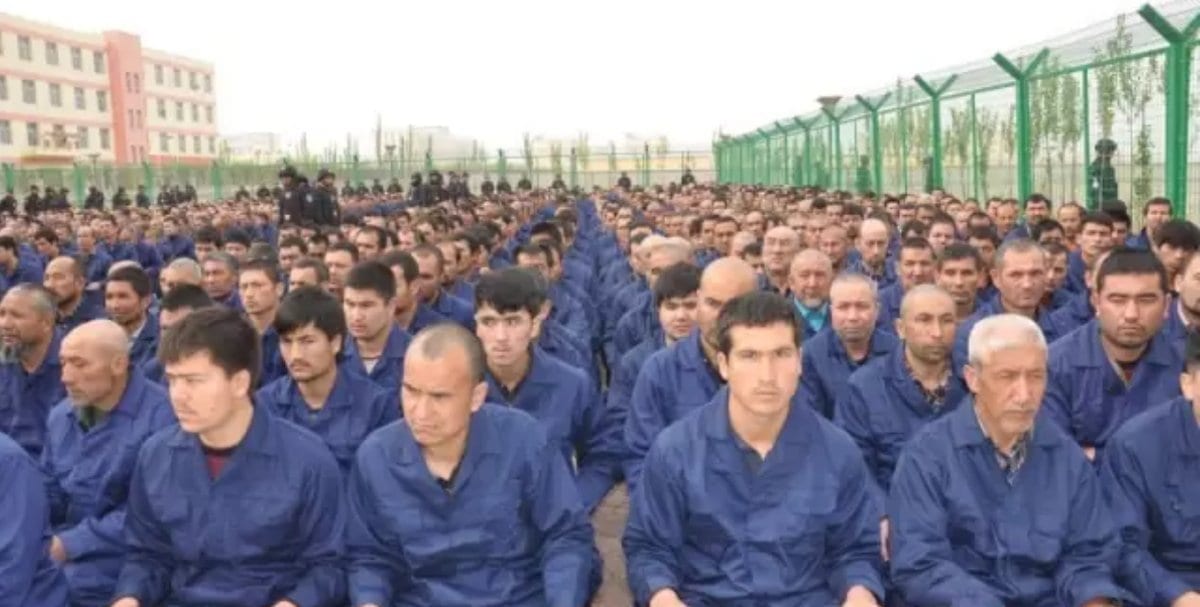Legislation to ban the importation of goods made by forced labor in western China amid a genocidal campaign primarily against Uyghur Muslims in the region appears poised to become United States law.
The House of Representatives passed the Uyghur Forced Labor Prevention Act Dec. 14 without opposition in a voice vote hours after the sponsors of measures in both congressional chambers announced they had reached an agreement on a common proposal. The Senate is seeking to consider the legislation on an expedited basis.
The White House, meanwhile, said Tuesday that President Joe Biden would sign the bill when it reaches his desk.
When enacted, the new law will prohibit products made with forced labor in the Xinjiang Uyghur Autonomous Region from being introduced into the American market. Under the legislation, there will be a “rebuttable presumption” that “goods mined, produced or manufactured” in Xinjiang are prohibited from importation to the United States. Exceptions to the ban include if “clear and convincing evidence” exists an item was not produced “wholly or in part by forced labor.”
The Chinese Communist Party’s (CCP) efforts against the Uyghurs have included not only forced labor but detention in “re-education” camps and a coercive population control program of abortion and sterilization.
Congress’ collaborative effort came six months after messengers to the Southern Baptist Convention’s (SBC) annual meeting approved a resolution that condemned the CCP’s treatment of the Uyghurs and called for the U.S. government to take “concrete actions” to end the genocide. With its June 15 passage of the resolution, the SBC apparently became the first Christian denomination to denounce China’s campaign against the Uyghurs as genocide.
Brent Leatherwood, acting president of the Southern Baptist Ethics & Religious Liberty Commission (ERLC), said he “was heartened” to find out about the agreement between the House and Senate.
“At a time when Washington is synonymous with gridlock, it is no small thing for members of Congress to work together on a bipartisan basis to get this critical bill to [Biden’s] desk,” he said in a written statement. “Its passage ensures America will take steps to counter China for its genocidal treatment of the Uyghurs. President Biden should sign it into law without delay.”
Leatherwood expressed his gratitude to Sens. Marco Rubio, R-Fla., and Jeff Merkley, D-Ore., and Reps. Jim McGovern, D-Mass., and Chris Smith, R-N.J., for their leadership on the legislation.
“Six months ago, the SBC spoke with one voice to become the first denomination to rightly label the atrocities being perpetrated against the Uyghur people a genocide,” he said. “I am confident our entire convention of churches is thankful our nation will no longer tolerate the CCP profiting from its ghoulish oppression of the Uyghurs once this [bill] becomes law.”
Smith, a longtime advocate for religious freedom and human rights overseas, said the bill “is important and necessary to end or at least mitigate the United States’ complicity” in the genocide.
The Senate passed an import ban on products from Xinjiang without opposition in July, and the House approved a different version nearly unanimously Dec. 8. McGovern and Rubio announced Tuesday they had agreed on a compromise to present to both chambers.
Progress in adopting legislation to combat forced labor in Xinjiang followed news reports that the White House and major American corporations were working to weaken the proposal. The Biden administration urged Democrats to “essentially water [the bill] down,” according to a Dec. 2 column in The Washington Post. Major companies such as Apple, Coca-Cola and Nike lobbied for a weaker measure because they benefit from the labor situation in Xinjiang, The New York Times reported late last year.
White House Press Secretary Jen Psaki said Tuesday, however, Biden welcomed the congressional agreement on the legislation. “We agree with Congress that action can and must be taken to hold the People’s Republic of China accountable for genocide and human rights abuses and to address forced labor in Xinjiang,” she said.
After the report of administration efforts to weaken the bill, the ERLC’s Leatherwood wrote Secretary of State Antony Blinken Dec. 3 to ask him to “do everything within his power” to gain passage of the legislation. The bill “is a necessary step for the United States to rightly prioritize human dignity in China,” he wrote.
The Biden administration announced Dec. 6 it has implemented a diplomatic boycott of the 2022 Winter Olympics in Beijing because of “China’s actions on Taiwan, human rights, Hong Kong and the South China Sea.” The Olympics are scheduled to begin Feb. 4. Australia, Britain and Canada are among other countries that have announced diplomatic boycotts.
The CCP’s oppressive practices in the Xinjiang Uyghur Autonomous Region include tracking Uyghur Muslims by means of a high-tech surveillance system that has obtained genetic data on many residents, according to reports. More than 1 million of the 12 million Uyghurs, and maybe as many as 3 million, have been detained in “re-education” camps, and forced labor by prisoners is common. Life in the camps can result in indoctrination, as well as rape, torture and coercive organ harvesting. Uyghur women are also at the mercy of forced abortions and sterilizations.
Then-Secretary of State Michael Pompeo announced in January on the last full day of the Trump administration his determination that China is guilty of genocide in Xinjiang. Blinken affirmed that designation after he took office under Biden.
According to a 1948 United Nations treaty, genocide is defined as murder and other acts with the “intent to destroy, in whole or in part, a national, ethnical, racial or religious group.”
The ERLC has long opposed China’s oppression of religious liberty and other human rights. Support for the Uyghur Forced Labor Prevention Act has been part of its public policy agenda in 2021.
(EDITOR’S NOTE – Tom Strode is Washington bureau chief for Baptist Press. Brandon Porter, associate vice president for convention news at the SBC Executive Committee, contributed to this report.)


